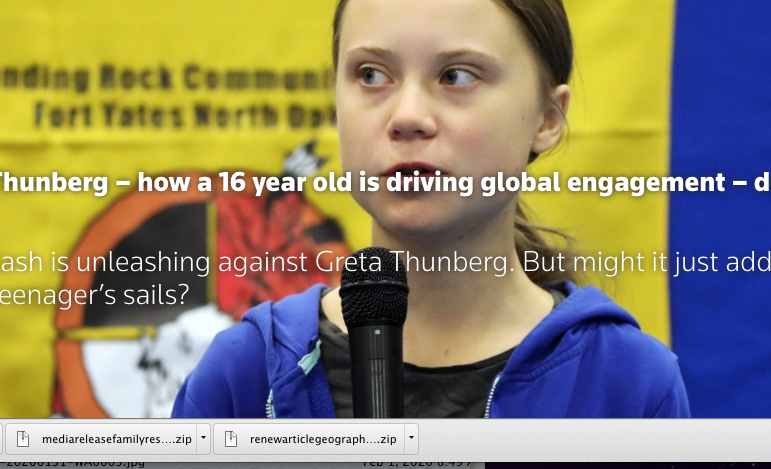Greta Thunberg – how a 16 year old is driving global engagement – despite vitriol
By Giles Crosse From Reuters Community

A backlash is unleashing against Greta Thunberg. But might it just add wind to the teenager’s sails?
The activist group, Extinction Rebellion, projected a speech by Swedish climate activist Greta Thunberg onto the side of the UK Houses of Parliament early in October 2019. It’s one of the latest stunts in a wave of publicity designed to capture the attention of the world. Offering more evidence of how Greta and Gen Z are engaging with politics and influencing more powerfully than ever.
But, hostility appears rife. The Guardian reported that Arron Banks, the Brexit backer warned the teenager that “freak yachting accidents do happen in August” as he responded to a tweet by Green Party MP Caroline Lucas who said Thunberg was carrying “the vital message to the UN that time is running out to address the climate emergency”.
Prof Tanja Bueltmann, founder of campaign group EU Citizens’ Champion, told The Guardian that:
“Verbal attacks on Greta Thunberg have been coming from many different people for quite some time.”
But this vitriol appears to be doing little to dilute Greta’s message, nor her supporters enthusiasm. It could, research suggests, serve to damage her detractors instead.
Why are young climate activists undimmed by hate?


REUTERS/Mike Hutchings
In a story earlier this year, Nieman Lab cites findings from the Reuters Institute for the Study of Journalism. The Reuters Institute’s Digital News Report for 2019 surveyed more than 75,000 people in 38 countries about their digital news consumption.
Nieman Lab noted that, according to the report, news avoidance is growing, especially in the UK. 58% of respondents cited ‘Negative impact on my mood’ as a reason for avoiding the news.
As a result, Greta’s detractors may be doing more harm than good for their own messaging and publicity; by unleashing vitriol against Greta, they may in fact just be restricting their messaging, as exhausted, positivity-poor readers turn off the news-based torrent of negativity.
And the Reuters report finds that “news brands are less important” for younger people.
Indeed, 18 to 24 year olds are quite a bit more likely to say that their first contact with news in the morning comes on a smartphone, and when they pick up their phones for news, they are a lot more likely to go to social media (including messaging groups) than to a publisher’s app.
Arguably then, negative responses to young activists, quoted in traditional media, may in many cases never actually reach Gen Z eyes; they’re gazing elsewhere. But such responses will reach older generations or traditional readers, who, as outlined, may themselves switch off from the relentlessly harsh messaging.
Cycles of negativity


REUTERS/Juan Medina
True or false, these arguments have implications for the dissemination of information. If negativity turns off young and old, plus younger generations get their news from less traditional media sources, is there anyone left who cares about what the detractors, targeting the likes of Greta, have to say?
The answer; modern newsrooms should. It is their job to offer up unbiased, equivocal reporting, and find a way to get the balanced viewpoint out there through the right channels.
Why swerving negativity can help publishers engage with Gen Z
Simple quotes from Reuters Institute’s Digital News Report illustrate why today’s publishers, if they seek to engage effectively, must embrace the positives and frame stories intelligently with balanced viewpoints to minimise lack of response.
“Many of our interviewees felt that some (popular) media outlets simply had an unconstructive mindset: “The Daily Mail. They are always on social media, trying to make someone look bad.” Ellie, 18–20, UK
“News is a major negative and has a huge impact on everyone who watches it. There is never any positive or happy news.” Female, 24–35, UK
Not every Gen Z story has to be 100 per cent supportive of Greta. Rather, as the Digital Report notes, ‘Younger audiences in particular don’t want to give up instant, frictionless (and ideally free) access to range of diverse voices and opinions.’
The art of listening
Today’s publishers must listen to what Gen Z has to say:
Young people were often frustrated by the negativity of the news agenda, about sensationalism and about the perceived agenda of the mainstream media. Sometimes they feel that the views and concerns of their generation – such as climate change and minority rights – are not properly represented.
But equally they do not want traditional media to go away, dumb down, or radically change their style just to appeal to them – Reuters Institute’s Digital News Report
What’s plain is the fury against Greta is no joke. The BBC has picked up on negativity, reporting that Greta Thunberg has become a primary target.
Ms Thunberg is not the only eco-activist under fire, it notes. Four young climate campaigners told the BBC of the abuse they have been subjected to. One was compared to Nazi propaganda chief Joseph Goebbels while another said she had been racially abused.
These environmentalists have asked difficult questions of politicians, and been ruthlessly derided for doing so. With hostility heightening, why are young climate activists facing so much hate? – The BBC
Greta’s brand of environmentalism, argues the BBC, does not appeal to everyone. In particular, those who “don’t like being told what to do” and feel children “don’t have the right to say these things”, Richard Black, the director of the environmental think tank the Energy & Climate Intelligence Unit, told the organization.
Climate activism will always cause division. But for responsible newsrooms, solid understanding of the reader response caused by negativity, and the newer ways in which young and old audiences engage in such conversations will be increasingly essential to honest and equitable reporting.
For more on this story and video go to: https://www.reuterscommunity.com/topics/monetization/greta-thunberg-how-a-16-year-old-is-driving-global-engagement-despite-vitriol/





